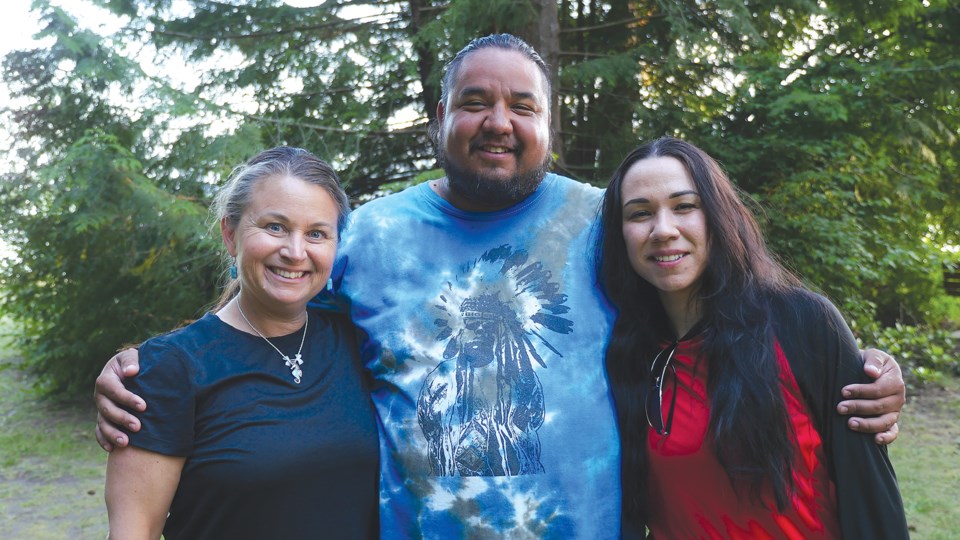A documentary made on the territory of the shíshálh Nation will have its West Coast debut in Vancouver this weekend. The feature-length film s-yéwyáw/Awaken enshrines the teachings of Indigenous Elders while modelling intergenerational dialogue in action.
“It’s rooted in community, it’s grounded in relationships,” said director Liz Marshall. “Nothing felt rushed. There’s a lot of dialogue but that dialogue is not being spoken. It’s relational, it’s conversation, it’s emotional.”
s-yéwyáw / Awaken was directed by Marshall, a Gibsons transplant from Toronto with roots on the Sunshine Coast. Her aunt, Nancy Denham, founded the syiyaya Reconciliation Movement alongside former elected shíshálh Nation hiwus Garry Feschuk. Marshall’s previous films, especially 2013’s The Ghosts in Our Machine, have earned awards at festivals like the Hot Docs Canadian International Documentary Festival.
Marshall collaborated with a team that included impact producer Charlene SanJenko, musician and medicine woman Kawaya7 (Ecko Aleck) of the Nlaka’pamux Nation, and filmmaker and traditional wellness coordinator Kwamanchi (Alfonso Salinas) of the shíshálh Nation.
“The wisdom that Elders are sharing has always been the very thing that leads us back to who we are,” said SanJenko. “It’s not that it’s anything new. It’s always been there. But now people are actually potentially pausing long enough to hear it. So our job is to turn up that volume and make it accessible.”
SanJenko, who was among more than 150 children taken from the Splatsin First Nation and adopted by non-Indigenous families, only began to reconnect with her Indigenous heritage in her fifties. “I’m a baby in all of this,” SanJenko said. “It’s only been five years that I’ve been actively working towards my own healing and growth.”
In the documentary, SanJenko, Aleck and Salinas learn and document traditional cultural teachings and legacies of their Elders, including impacts of Canada’s residential school system. The storyline is structured to draw attention to the filmmaking process itself, and the respectful collaboration between Indigenous and settler team members.
The film depicts Salinas as he learns from 90-year-old matriarch Barbara Higgins about the protocols for a traditional canoe ceremony, pursuing his dream to create a canoe family for the shíshálh Nation. Higgins passed away on November 7.
Aleck, whose spellbinding music and spoken-word performance anchor the film’s soundtrack, is filmed in conversation with her father Terry Aleck.
“My parents weren’t able to stop intergenerational traumas from happening,” observed Aleck, “but they did build me up with intergenerational strength and cultural teachings and medicine tools that I could use. Through this process, the healing that’s happened between me and my dad is on the screen for everyone to see. The healing that happened between me and my dad is more than I ever thought I would get in this lifetime.”
Aleck credits Marshall, a non-Indigenous filmmaker, for her willingness to be transformed during the creative process. “She just came in and said, ‘I’m open, teach me,’” recalled Aleck. “Every time I sat down with her to share our teaching, she would take it away and come back and be a better person.”
Additional filming for s-yéwyáw/Awaken took place on homelands of the Skwxwú7mesh Peoples, xʷməθkʷəy̓əm and səlilwətaɬ Territories, Splatsin te Secwepemcul’ecw, Qualicum First Nation and Nlaka’pamux Territory.
The documentary will be screened at the Raven’s Cry Theatre in Sechelt on Dec. 13 and 14. It received the People’s Choice Award following its world premiere last month at the Planet In Focus International Environmental Film Festival in Toronto.
The film’s purpose is to honour and share the influence of Elders, Aleck added. It also has the potential to promote reconciliation.
“My hope is for non-Indigenous [audiences] to find one thing that resonates so deeply with them that they take it back to their reflections in the mirror, back to their kitchen table,” she said. “That’s where we witness true change happening: at the kitchen table.”



